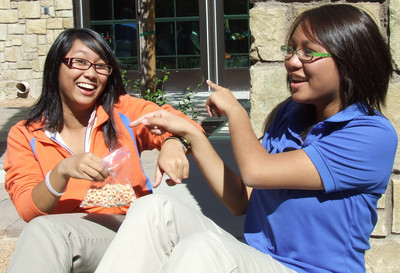ALL IN THE FAMILY
She's become accustomed to the confusion, but it still makes her laugh.
Regine DeJesus has been attending school with her sister, Camille, for nearly 10 years.
Navigating high school is nerve-wracking for anyone -- the homework, the popularity contests, the awkward first romances -- but to do so with a sibling in tow presents its own set of challenges.
"It's funny, because even though Camille is two years older than me, we look a lot alike," the 15-year-old Bishop Gorman High School sophomore says. "Sometimes students, and even teachers, mistake one of us for the other."
As if on cue, one of Camille's friends walks up from behind Regine and starts playing with her hair, noting that it looks different and is softer than usual.
"See what I mean!" Regine chuckles.
The younger of the two, Regine admits to feeling a little lost in Camille's shadow from time to time, and has to rely on her big sis, who's old enough to drive, for transportation.
For her part, Camille feels pressure to be a role model for Regine.
It's these kind of issues that are commonplace for siblings who attend school with one another.
According to Christopher A. Kearney, a psychology professor at the University of Nevada, Las Vegas, there is no specific data proving or disproving the psychological effects of siblings going to school together.
However, there are obvious advantages and disadvantages to the situation.
"Students who go to school together have social support, mutual friendship-building, greater assistance with homework, and protection from threats such as bullying," Kearney says. "This is important because it's like having a support net at school. It creates a comfortable atmosphere for both students."
However, he continues, "drawbacks arise when there is increased competition, unfair parental comparisons and family tension if a child is progressing in a certain area."
According to Kearney, parents and teachers can aggravate problems when direct comparisons are made between the two children.
"The best approach to the situation is for parents and teachers to remember that each child should be encouraged to pursue his or her own talents," he says.
Though every student is different, some siblings who attend school together bond over common interests.
Jillian Davis, a 17-year-old Bishop Gorman student, has been going to school with her three older siblings her entire life. Although they squabble from time to time, they have one main thing that holds them together: tennis.
"To be a Davis, you have to play tennis, and you have to play well," she says. "My siblings and I have a legacy at Gorman because of tennis. We've helped the team win State around six times. We just connect on tennis. It brings us together."
According to Davis, there are ups and downs to being the youngest of several school-age siblings.
One benefit: When she first started high school, she didn't have to work her way through the social hierarchy like most teenagers.
Her siblings -- Allison, Tommy and Lauren -- already had accomplished that for her.
"I walked onto campus somewhat popular," Davis says. "Everyone knew Lauren, and she' s only a year older than me, so I was friends with her friends. But at the same time, sometimes that wasn't so great that everyone knew my siblings."
Indeed, Davis believes that she was prejudged by some of her teachers because of her brother and sisters.
"What was worst was when I had a teacher who I think didn't like my siblings," she says. "Sometimes it felt like he was taking out his anger with my brother and sisters on me."
However, according to Jay Bonar, a history teacher at Bishop Gorman for 20 years, he and colleagues go out of their way to avoid comparing students to their siblings.
Bonar admits that during his first year, he found himself contrasting students who were related to one another.
But he soon realized that comparing students was an ineffective way to teach.
"I honestly do not see any justification for comparing siblings," Bonar says. "It's incredibly unprofessional. All siblings have different personalities, mannerisms and academic strengths and weaknesses."
And that's a notion that the DeJesus' can readily second.
Despite all the drama inherent in growing up and going to school together, they've managed to weather the difficulties and stay close.
"If she weren't my sister," says Camille, "she'd be my best friend."
R-Jeneration

















